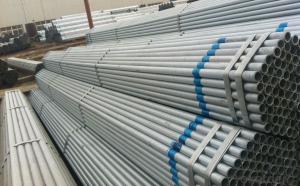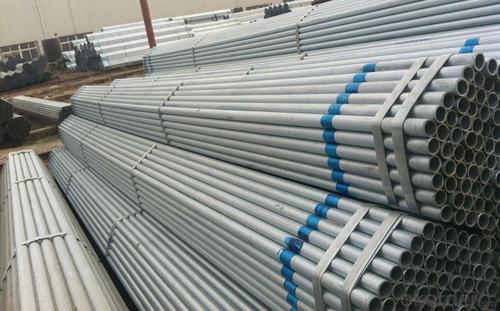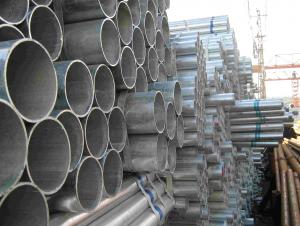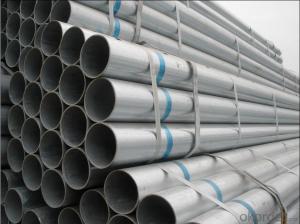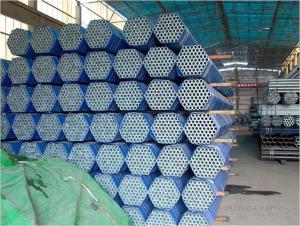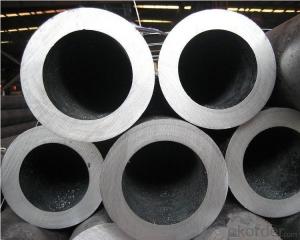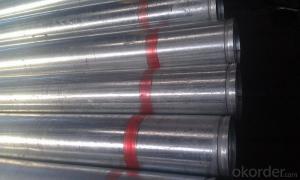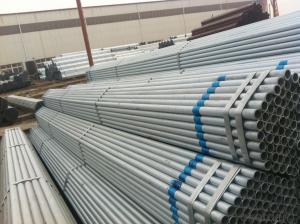Hot Galvanized scaffolding Pipe For Building With BS 1387
- Loading Port:
- China Main Port
- Payment Terms:
- TT OR LC
- Min Order Qty:
- -
- Supply Capability:
- -
OKorder Service Pledge
OKorder Financial Service
You Might Also Like
O.D | O.D tolerance | W.T | Thickness Tolerance |
1/2-12'' | ±0.3mm | 1.5-12 MM | ±8% |
Length | 3m,4m,5.8m,6m or according customers' requirements | ||
Certificate | ISO9001-2008,EN10210,API,Raw material cert,Mill cert,Reap on site inspection report,SGS,BV | ||
Standard | ASTM A53/ASTM A36 BS1387/BS1139/EN39/EN10219/EN10217/EN10297/EN10296/EN10025 etc | ||
Material | Q195/215/235/345, SS330/400/500, S235JR/S235JQ/S235J2, etc | ||
Inspection | With Hydraulic Testing, Eddy Current , Infrared Test, etc | ||
Technique: | Welded Hot rolled,heat extrusion | ||
Packing | in bundle or in bulk, PVC in blue or in strip | ||
Usage | For construction, Pluid and Greenhouse | ||
Main market: | Middle east,North and South America, East and West Europe, South and southeast Asia,Australia,Africa, | ||
Place of Origin | China | ||
HS code: | 73063090 | ||
Productivity | 2000Ton/Month | ||
Processing | galvanzied,inner and outer stab clean,bevelled oiled,painted black threading,with coupling and plastic caps protected packing in plastic cloths,3PE,FBE,corrosion resistant coating | ||
- Q: How are steel pipes cleaned and maintained?
- Steel pipes are cleaned and maintained through various methods. The process typically involves removing any debris or rust from the pipes using wire brushes or sandblasting. After cleaning, a protective coating is applied to prevent corrosion. Regular inspections and maintenance checks are also conducted to identify any potential issues such as leaks or weak points, ensuring the pipes remain in optimal condition.
- Q: Can steel pipes be used for conveying potable water?
- Indeed, steel pipes have the capability to convey potable water. Nevertheless, there are certain factors and precautions that necessitate consideration. Steel pipes possess strength and durability, rendering them suitable for the transportation of water across significant distances. They are also resistant to corrosion and capable of enduring high levels of pressure. In order to guarantee the safety and quality of the water being conveyed, it is crucial to employ pipes that have been specifically designed and manufactured for potable water applications. These pipes are often equipped with coatings or linings composed of materials that inhibit the leaching of contaminants into the water, such as epoxy or cement mortar lining. Furthermore, regular maintenance and inspections should be conducted to prevent the accumulation of sediments or rust that could potentially impact the water quality. It is important to acknowledge that steel pipes may prove more costly in comparison to alternative materials such as plastic or copper. Nevertheless, their longevity and reliability render them a cost-effective choice in the long run. Adhering to local regulations and standards concerning the utilization of steel pipes for conveying potable water is also imperative to ensure the well-being and safety of consumers.
- Q: How are steel pipes used in the telecommunications industry?
- Steel pipes are used in the telecommunications industry primarily for the installation and protection of underground fiber optic cables. These pipes provide a sturdy and durable infrastructure for the cables, ensuring their safety from external factors such as weather conditions or accidental damage. Additionally, steel pipes are also used for the construction of telecommunication towers, providing the necessary strength and support for antennas and other equipment.
- Q: How are steel pipes used in the telecommunications sector?
- Steel pipes are commonly used in the telecommunications sector for various purposes. Firstly, steel pipes are used as conduit for underground cable installations. These pipes provide protection and support to the fiber optic cables that carry data and voice signals across long distances. The sturdy nature of steel pipes ensures that the cables remain safe from external factors such as moisture, rodents, and accidental damage. Additionally, steel pipes are used in the construction of telecommunication towers and masts. These structures require a strong and durable material to support the weight of antennas, transmitters, and other equipment. Steel pipes, with their high tensile strength and resistance to harsh weather conditions, are ideal for this purpose. Moreover, steel pipes are used for the installation of overhead communication lines. These lines are often suspended between poles or towers, and steel pipes are used as supports or brackets to hold the cables in place. The corrosion-resistant properties of steel make it a reliable choice for outdoor installations that are exposed to the elements. In summary, steel pipes play a crucial role in the telecommunications sector by providing protection, support, and durability to cable installations, tower constructions, and overhead communication lines. Their strength and resistance to environmental factors make them an essential component in building and maintaining reliable telecommunications networks.
- Q: Can steel pipes be used for drinking water supply?
- Yes, steel pipes can be used for drinking water supply. Steel pipes are commonly used in water distribution systems due to their strength, durability, and ability to withstand high pressures. However, it is important to note that the steel used in these pipes must be specifically designed and approved for potable water applications to ensure that it does not contaminate the water with any harmful substances. Additionally, proper maintenance and regular inspections are necessary to prevent the formation of rust or corrosion, which can affect the quality of the water.
- Q: How are steel pipes used in high-rise buildings?
- Steel pipes are used in high-rise buildings for various purposes, including structural support, plumbing, and HVAC systems. They provide the necessary strength and durability to withstand the weight and forces exerted on tall buildings, while also facilitating the efficient distribution of water, gas, and air throughout the entire structure.
- Q: How are steel pipes protected against corrosion?
- Steel pipes are protected against corrosion through various methods such as coating them with protective materials like paint or epoxy, galvanizing them with a zinc coating, or using cathodic protection techniques such as sacrificial anodes or impressed current systems.
- Q: What place must use galvanized steel pipe to make lighting line?
- Galvanized steel is widely used in construction, machinery, coal, chemical industry, railway vehicles, automobile industry, highway, bridge, container, sports facilities, agricultural machinery, petroleum machinery, prospecting machinery and other manufacturing industries.
- Q: What is the difference between steel pipes and cast iron soil pipes?
- Steel pipes and cast iron soil pipes differ in their composition and characteristics. Steel pipes are made of an alloy of iron and carbon, providing them with high strength and durability. They are commonly used for transporting fluids and gases, and are resistant to corrosion. On the other hand, cast iron soil pipes are made from molten iron that is poured into molds. They are primarily used for drainage and sewage systems due to their excellent soundproofing properties. Cast iron soil pipes are more resistant to fire and have a longer lifespan compared to steel pipes. Additionally, cast iron soil pipes are typically heavier and thicker than steel pipes, making them more suitable for underground installations. However, steel pipes are lighter and easier to handle, making them a preferred choice for above-ground applications. Ultimately, the choice between steel pipes and cast iron soil pipes depends on the specific requirements of the project, such as the intended use, location, and budget.
- Q: Are steel pipes recyclable?
- Yes, steel pipes are recyclable. Steel is a highly recyclable material and can be melted down and repurposed into new steel products, including pipes. Recycling steel pipes helps conserve natural resources and reduces the need for new steel production.
Send your message to us
Hot Galvanized scaffolding Pipe For Building With BS 1387
- Loading Port:
- China Main Port
- Payment Terms:
- TT OR LC
- Min Order Qty:
- -
- Supply Capability:
- -
OKorder Service Pledge
OKorder Financial Service
Similar products
Hot products
Hot Searches
Related keywords
